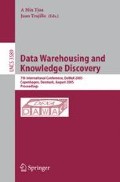Abstract
Temporal association rule mining promises the ability to discover time-dependent correlations or patterns between events in large volumes of data. To date, most temporal data mining research has focused on events existing at a point in time rather than over a temporal interval. In comparison to static rules, mining with respect to time points provides semantically richer rules. However, accommodating temporal intervals offers rules that are richer still. In this paper we outline a new algorithm to discover frequent temporal patterns and to generate richer interval-based temporal association rules.
Access this chapter
Tax calculation will be finalised at checkout
Purchases are for personal use only
Preview
Unable to display preview. Download preview PDF.
References
Roddick, J.F., Spiliopoulou, M.: A survey of temporal knowledge discovery paradigms and methods. IEEE Transactions on Knowledge and Data Engineering 14, 750–767 (2002)
Agrawal, R., Srikant, R.: Mining sequential patterns. In: Proceedings of 11th International Conference on Data Engineering, pp. 3–14 (1995)
Mannila, H., Toivonen, H., Verkamo, A.: Discovery of frequent episodes in event sequences. Data Mining and Knowledge Discovery 1, 259–289 (1997)
Li, Y., Ning, P., Wang, X.S., Jajodia, S.: Discovering calendar-based temporal association rules. In: Proceedings of the 8th International Symposium on Temporal Representation and Reasoning, pp. 111–118 (2001)
Ozden, B., Ramaswamy, S., Silberschatz, A.: Cyclic association rules. In: Proceedings of the 14th International Conference on Data Engineering, pp. 412–421 (1998)
Lu, H., Feng, L., Han, J.: Beyond intratransaction association analysis:Êmining multidimensional intertransaction association rules. ACM Transactions on Information Systems 18, 423–454 (2000)
Bettini, C., Wang, X.S., Jajodia, S.: Testing complex temporal relationships involving multiple granularities and its application to data mining. In: Proceedings of the 15th ACM SIGACT-SIGMOD-SIGART Symposium on Principles of Database Systems, Montreal, Canada, pp. 68–78 (1996)
Allen, J.: Maintaining knowledge about temporal intervals. Communications of the ACM 26, 832–843 (1983)
Freksa, C.: Temporal reasoning based on semi-intervals. Artificial Intelligence 54, 199–227 (1992)
Roddick, J.F., Mooney, C.H.: Linear temporal sequences and their interpretation using midpoint relationships. IEEE Transactions on Knowledge and Data Engineering 17, 133–135 (2005)
Villafane, R., Hua, K.A., Tran, D., Maulik, B.: Mining interval time series. In: Data Warehousing and Knowledge Discovery, pp. 318–330 (1999)
Kam, P.S., Fu, A.W.C.: Discovering temporal patterns for interval-based events. In: Kambayashi, Y., Mohania, M., Tjoa, A.M. (eds.) DaWaK 2000. LNCS, vol. 1874, pp. 317–326. Springer, Heidelberg (2000)
Höppner, F.: Learning temporal rules from state sequence. In: Proceedings of IJCAI Workshop on Learning from Temporal and Spatial Data, Seattle, USA, pp. 25–31 (2001)
Agrawal, R., Srikant, R.: Fast algorithms for mining association rules. In: Proceedings of the 20th International Conference on Very Large Data Bases, pp. 487–499 (1994)
Zaki, M.J.: Spade: An efficient algorithm for mining frequent sequences. Machine Learning Journal 42, 31–60 (2001)
Lin, M.Y., Lee, S.Y.: Fast discovery of sequential patterns by memory indexing. In: Kambayashi, Y., Winiwarter, W., Arikawa, M. (eds.) DaWaK 2002. LNCS, vol. 2454, pp. 150–160. Springer, Heidelberg (2002)
Srikant, R., Agrawal, R.: Mining sequential patterns: Generalizations and performance improvements. In: Proceedings of the 5th International Conference on Extending Database Technology, Avignon, France, pp. 3–17 (1996)
Pei, J., Han, J., Mortazavi-Asl, B., Pinto, H., Chen, Q., Dayal, U., Hsu, M.C.: Prefixspan: Mining sequential patterns efficiently by prefixprojected pattern growth. In: Proceedings of the 2001 International Conference on Data Engineering (ICDE 2001), Heidelberg, Germany, pp. 215–224 (2001)
Winarko, E., Roddick, J.F.: Discovering richer temporal association rules from interval-based data: Extended report. Technical SIE-05-003, School of Informatics and Engineering, Flinders University (2005)
Koundourakis, G., Theodoulidis, B.: Association rules and evolution in time. In: Proceedings of Methods and Applications of Artificial Intelligence, Second Hellenic Conference on AI, SETN 2002, Thessaloniki, Greece, pp. 261–272 (2002)
Author information
Authors and Affiliations
Editor information
Editors and Affiliations
Rights and permissions
Copyright information
© 2005 Springer-Verlag Berlin Heidelberg
About this paper
Cite this paper
Winarko, E., Roddick, J.F. (2005). Discovering Richer Temporal Association Rules from Interval-Based Data. In: Tjoa, A.M., Trujillo, J. (eds) Data Warehousing and Knowledge Discovery. DaWaK 2005. Lecture Notes in Computer Science, vol 3589. Springer, Berlin, Heidelberg. https://doi.org/10.1007/11546849_31
Download citation
DOI: https://doi.org/10.1007/11546849_31
Publisher Name: Springer, Berlin, Heidelberg
Print ISBN: 978-3-540-28558-8
Online ISBN: 978-3-540-31732-6
eBook Packages: Computer ScienceComputer Science (R0)

